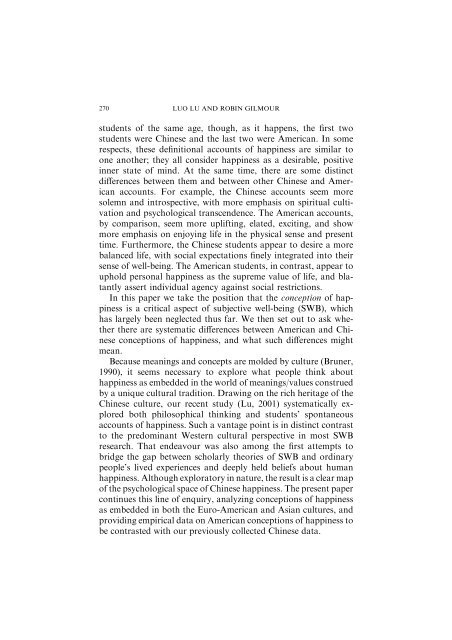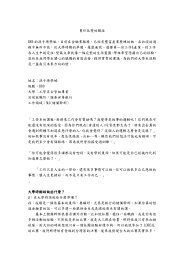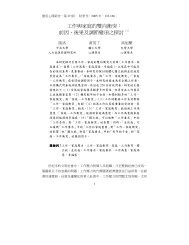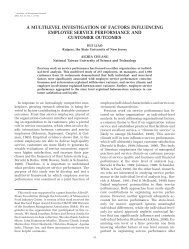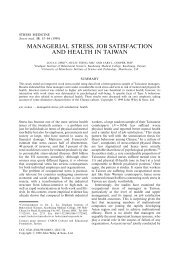CULTURE AND CONCEPTIONS OF HAPPINESS: INDIVIDUAL ...
CULTURE AND CONCEPTIONS OF HAPPINESS: INDIVIDUAL ...
CULTURE AND CONCEPTIONS OF HAPPINESS: INDIVIDUAL ...
You also want an ePaper? Increase the reach of your titles
YUMPU automatically turns print PDFs into web optimized ePapers that Google loves.
270LUO LU <strong>AND</strong> ROBIN GILMOURstudents of the same age, though, as it happens, the first twostudents were Chinese and the last two were American. In somerespects, these definitional accounts of happiness are similar toone another; they all consider happiness as a desirable, positiveinner state of mind. At the same time, there are some distinctdifferences between them and between other Chinese and Americanaccounts. For example, the Chinese accounts seem moresolemn and introspective, with more emphasis on spiritual cultivationand psychological transcendence. The American accounts,by comparison, seem more uplifting, elated, exciting, and showmore emphasis on enjoying life in the physical sense and presenttime. Furthermore, the Chinese students appear to desire a morebalanced life, with social expectations finely integrated into theirsense of well-being. The American students, in contrast, appear touphold personal happiness as the supreme value of life, and blatantlyassert individual agency against social restrictions.In this paper we take the position that the conception of happinessis a critical aspect of subjective well-being (SWB), whichhas largely been neglected thus far. We then set out to ask whetherthere are systematic differences between American and Chineseconceptions of happiness, and what such differences mightmean.Because meanings and concepts are molded by culture (Bruner,1990), it seems necessary to explore what people think abouthappiness as embedded in the world of meanings/values construedby a unique cultural tradition. Drawing on the rich heritage of theChinese culture, our recent study (Lu, 2001) systematically exploredboth philosophical thinking and students’ spontaneousaccounts of happiness. Such a vantage point is in distinct contrastto the predominant Western cultural perspective in most SWBresearch. That endeavour was also among the first attempts tobridge the gap between scholarly theories of SWB and ordinarypeople’s lived experiences and deeply held beliefs about humanhappiness. Although exploratory in nature, the result is a clear mapof the psychological space of Chinese happiness. The present papercontinues this line of enquiry, analyzing conceptions of happinessas embedded in both the Euro-American and Asian cultures, andproviding empirical data on American conceptions of happiness tobe contrasted with our previously collected Chinese data.


